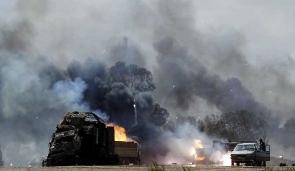Arab League condemns broad Western bombing campaign in Libya
The Libyan Revolution has reached a critical juncture after Western countries began military attacks that exceeded the goal of a no-fly zone over Libyan airspace in a remarkable timing that coincides with the anniversary of the U.S. invasion of Iraq in 2003.
Coalition forces from France, the United Kingdom, United States and other nations began striking the regime's military assets on Saturday as part of an “effort” to enforce a UN Security Council resolution aimed at “protecting” Libyan civilians.
The forces have destroyed on Sunday night a three-storey building in a military command centre on the Bab al-Azizia used by Muammar Gaddafi as a setting for televised addresses, and which was bombed by the United States in 1986.
The regime invited journalists to visit the site of the attack early on Monday morning.
Coalition officials told journalists on Monday that the building hit in the attack was a military command and control centre for Gaddafi.
Other loud explosions rocked Tripoli on Sunday night, as Britain's ministry of defense said one of its submarines had again fired guided Tomahawk missiles on Libyan air defense systems.
The blasts came two days after the United Nations Security Council authorized international military action to enforce a no-fly zone over Libya, as well as "all necessary measures" to prevent attacks by Gaddafi forces on civilians.
Despite the strikes, the Libyan leader has vowed to fight on and in a televised address, a defiant Gaddafi promised a "long war" that his forces would win. "We will fight and we will target any traitor who is co-operating with the Americans or with the Christian Crusade," he said.
Arab League secretary general Amr Moussa deplored the broad scope of the U.S.-European bombing campaign in Libya and said Sunday that he would call a league meeting to reconsider Arab approval of the Western military intervention.
Moussa said the Arab League’s approval of a no-fly zone on March 12 was based on a desire to prevent Gaddafi’s air force from attacking civilians and was not designed to endorse the intense bombing and missile attacks — including on Tripoli, the capital, and on Libyan ground forces.
Moussa’s declaration suggested that some of the 22 Arab League members were taken aback by what they have seen and wanted to modify their approval lest they be perceived as accepting outright Western military intervention in Libya.
UN chief Ban Ki-moon told the Arab League on Monday that it was vital the world speak as one on Libya, speaking next to the bloc's secretary general. "It is important that the international community speak with one voice to implement the second council resolution," he said referring to a UN Security Council passed on Thursday authorizing military action to prevent Gaddafi forces from attacking civilians. Ban said that "strong and decisive measures" had only been possible because of the support given by the Arab over Libya.
Around 50 demonstrators loyal to Gaddafi surrounded UN chief on Cairo's Tahrir Square Monday forcing him to retreat into the adjacent Arab League headquarters, an AFP correspondent reported. Chanting "Down, Down USA, Libya, Libya," and carrying banners and the national flag of Gaddafi’s Libya the protesters surged towards Ban and his 15-strong delegation that included a UN deputy secretary general and former Chilean president Michelle Bachelet, the head of UN women.
